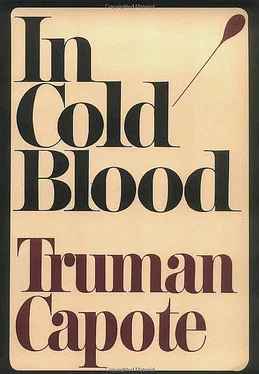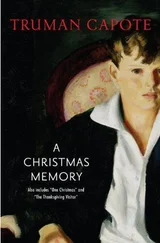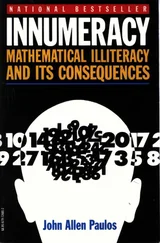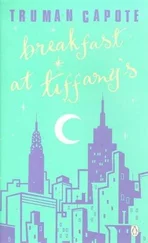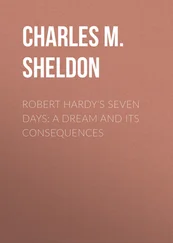Your friend, Don Cullivan
The name meant nothing, but Perry at once recognized the face in the photograph of a young soldier with crew-cut hair and round, very earnest eyes. He read the letter many times; though he found the religious allusions unpersuasive (“I’ve tried to believe, but I don’t, I can’t, and there’s no use pretending”), he was thrilled by it. Here was someone offering help, a sane and respectable man who had once known and liked him, a man who signed himself friend. Gratefully, in great haste, he started a reply: “Dear Don, Hell yes I remember Don Cullivan…”
Hickock’s cell had no window; he faced a wide corridor and the faces of other cells. But he was not isolated, there were people to talk to, a plentiful turnover of drunkards, forgers, wife-beaters, and Mexican vagrants; and Dick, with his light-hearted “con-man” patter, his sex anecdotes and gamy jokes, was popular with the inmates (though there was one who had no use for him whatever—an old man who hissed at him: “Killer! Killer!” and who once drenched him with a bucketful of dirty scrub water).
Outwardly, Hickock seemed to one and all an unusually untroubled young man. When he was not socializing or sleeping, he lay on his cot smoking or chewing gum and reading sports magazines or paperback thrillers. Often he simply lay there whistling old favorites (“You Must Have Been a Beautiful Baby,” “Shuffle Off to Buffalo”), and staring at an un-shaded light bulb that burned day and night in the ceiling of the cell. He hated the light bulb’s monotonous surveillance; it disturbed his sleep and, more explicitly, endangered the success of a private project—escape. For the prisoner was not as unconcerned as he appeared to be, or as resigned; he intended taking every step possible to avoid “a ride on the Big Swing.” Convinced that such a ceremony would be the outcome of any trial—certainly any trial held in the State of Kansas—he had decided to “bust jail. Grab a car and raise dust.” But first he must have a weapon; and over a period of weeks he’d been making one: a “shiv,” an instrument very like an ice pick—something that would fit with lethal niceness between the shoulder-blades of Undersheriff Meier. The weapon’s components, a piece of wood and a length of hard wire, were originally part of a toilet brush he’d confiscated, dismantled and hidden under his mattress. Late at night, when the only noises were snores and coughs and the mournful whistle-wailings of Santa Fe trains rumbling through the darkened town, he honed the wire against the cell’s concrete floor. And while he worked he schemed.
Once, the first winter after he had finished high school, Hickock had hitchhiked across Kansas and Colorado: “This was when I was looking for a job. Well, I was riding in a truck, and the driver, me and him got into a little argument, no reason exactly, but he beat up on me. Shoved me out. Just left me there. High the hell up in the Rockies. It was sleeting like, and I walked miles, my nose bleeding like fifteen pigs. Then I come to a bunch of cabins on a wooded slope. Summer cabins, all locked up and empty that time of year. And I broke into one of them. There was firewood and canned goods, even some whiskey. I laid up there over a week, and it was one of the best times I ever knew. Despite the fact my nose hurt so and my eyes were green and yellow. And when the snow stopped the sun came out. You never saw such skies. Like Mexico. If Mexico was in a cold climate. I hunted through the other cabins and found some smoked hams and a radio and a rifle. It was great. Out all day with a gun. With the sun in my face. Boy, I felt good. I felt like Tarzan. And every night I ate beans and fried ham and rolled up in a blanket by the fire and fell asleep listening to music on the radio. Nobody came near the place. I bet I could’ve stayed till spring.” If the escape succeeded, that was the course Dick had determined upon—to head for the Colorado mountains, and find there a cabin where he could hide until spring (alone, of course; Perry’s future did not concern him). The prospect of so idyllic an interim added to the inspired stealth with which he whetted his wire, filed it to a Umber stiletto fineness.
Thursday 10 March. Sheriff had a, shake-out. Searched through all the cells and found a shiv tucked under D’s mattress. Wonder what he had in mind (smile).
Not that Perry really considered it a smiling matter, for Dick, flourishing a dangerous weapon, could have played a decisive role in plans he himself was forming. As the weeks went by he had become familiar with life on Courthouse Square, its habitues and their habits. The cats, for example: the two thin gray toms who appeared with every twilight and prowled the Square, stopping to examine the cars parked around its periphery—behavior puzzling to him until Mrs. Meier explained that the cats were hunting for dead birds caught in the vehicles’ engine grilles. Thereafter it pained him to watch their maneuvers: “Because most of my life I’ve done what they’re doing. The equivalent.”
And there was one man of whom Perry had grown especially aware, a robust, upright gentleman with hair like a gray-and-silver skullcap; his face, filled out, firm-jawed, was somewhat cantankerous in repose, the mouth down-curved, the eyes downcast as though in mirthless reverie—a picture of unsparing sternness. And yet this was at least a partially inaccurate impression, for now and again the prisoner glimpsed him as he paused to talk to other men, joke with them and laugh, and then he seemed carefree, jovial, generous: “The kind of person who might see the human side”—an important attribute, for the man was Roland H. Tate, Judge of the 32nd Judicial District, the jurist who would preside at the trial of the State of Kansas versus Smith and Hickock. Tate, as Perry soon learned, was an old and awesome name in western Kansas. The judge was rich, he raised horses, he owned much land, and his wife was said to be very beautiful. He was the father of two sons, but the younger had died, a tragedy that greatly affected the parents and led them to adopt a small boy who had appeared in court as an abandoned, homeless child. “He sounds soft-hearted to me,” Perry once said to Mrs. Meier. “Maybe he’ll give us a break.”
But that was not what Perry really believed; he believed what he’d written Don Cullivan, with whom he now corresponded regularly: his crime was “unforgivable,” and he fully expected to “climb those thirteen steps.” However, he was not altogether without hope, for he too had plotted an escape. It depended upon a pair of young men that he had often observed observing him. One was red-haired, the other dark. Sometimes, standing in the Square under the tree that touched the cell window, they smiled and signaled to him—or so he imagined. Nothing was ever said, and always, after perhaps a minute, they drifted away. But the prisoner had convinced himself that the young men, possibly motivated by a desire for adventure, meant to help him escape. Accordingly, he drew a map of the Square, indicating the points at which a “getaway car” could most advantageously be stationed. Beneath the map he wrote: I need a Hacksaw Blade. Nothing else. But do you realize the consequences if you get caught (nod your head if you do)? It could mean a long stretch in prison. Or you might get killed. All for someone you don’t know. YOU BETTER THINK IT OVER!! Seriously! Besides, how do I know I can trust you? How do I know it isn’t a trick to get me out there and gun me down? What about Hickock? All preparations must include him.
Perry kept this document on his desk, wadded and ready to drop out the window the next time the young men appeared. But they never did; he never saw them again. Eventually, he wondered if perhaps he had invented them (a notion that he “might not be normal, maybe insane” had troubled him “ even when I was little, and my sisters laughed because I liked moonlight. To hide in the shadows and watch the moon”). Phantoms or not, he ceased to think of the young men. Another method of escape, suicide, replaced them in his musings; and despite the jailer’s precautions (no mirror, no belt or tie or shoelaces), he had devised a way to do it. For he also was furnished with a ceiling bulb that burned eternally, but, unlike Hickock, he had in his cell a broom, and by pressing the broom-brush against the bulb he could unscrew it. One night he dreamed that he’d unscrewed the bulb, broken it, and with the broken glass cut his wrists and ankles. “I felt ill breath and light leaving me,” he said, in a subsequent description of his sensations. “The walls of the cell fell away, the sky came down, I saw the big yellow bird.”
Читать дальше
